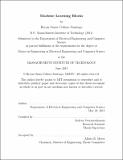Machine learning blocks
Author(s)
Collazo Santiago, Bryan Omar
DownloadFull printable version (8.590Mb)
Other Contributors
Massachusetts Institute of Technology. Department of Electrical Engineering and Computer Science.
Advisor
Kalyan Veeramachaneni.
Terms of use
Metadata
Show full item recordAbstract
This work presents MLBlocks, a machine learning system that lets data scientists explore the space of modeling techniques in a very easy and efficient manner. We show how the system is very general in the sense that virtually any problem and dataset can be casted to use MLBlocks, and how it supports the exploration of Discriminative Modeling, Generative Modeling and the use of synthetic features to boost performance. MLBlocks is highly parameterizable, and some of its powerful features include the ease of formulating lead and lag experiments for time series data, its simple interface for automation, and its extensibility to additional modeling techniques. We show how we used MLBlocks to quickly get results for two very different realworld data science problems. In the first, we used time series data from Massive Open Online Courses to cast many lead and lag formulations of predicting student dropout. In the second, we used MLBlocks' Discriminative Modeling functionality to find the best-performing model for predicting the destination of a car given its past trajectories. This later functionality is self-optimizing and will find the best model by exploring a space of 11 classification algorithms with a combination of Multi-Armed Bandit strategies and Gaussian Process optimizations, all in a distributed fashion in the cloud.
Description
Thesis: M. Eng., Massachusetts Institute of Technology, Department of Electrical Engineering and Computer Science, 2015. This electronic version was submitted by the student author. The certified thesis is available in the Institute Archives and Special Collections. Cataloged from student-submitted PDF version of thesis. Includes bibliographical references.
Date issued
2015Department
Massachusetts Institute of Technology. Department of Electrical Engineering and Computer SciencePublisher
Massachusetts Institute of Technology
Keywords
Electrical Engineering and Computer Science.